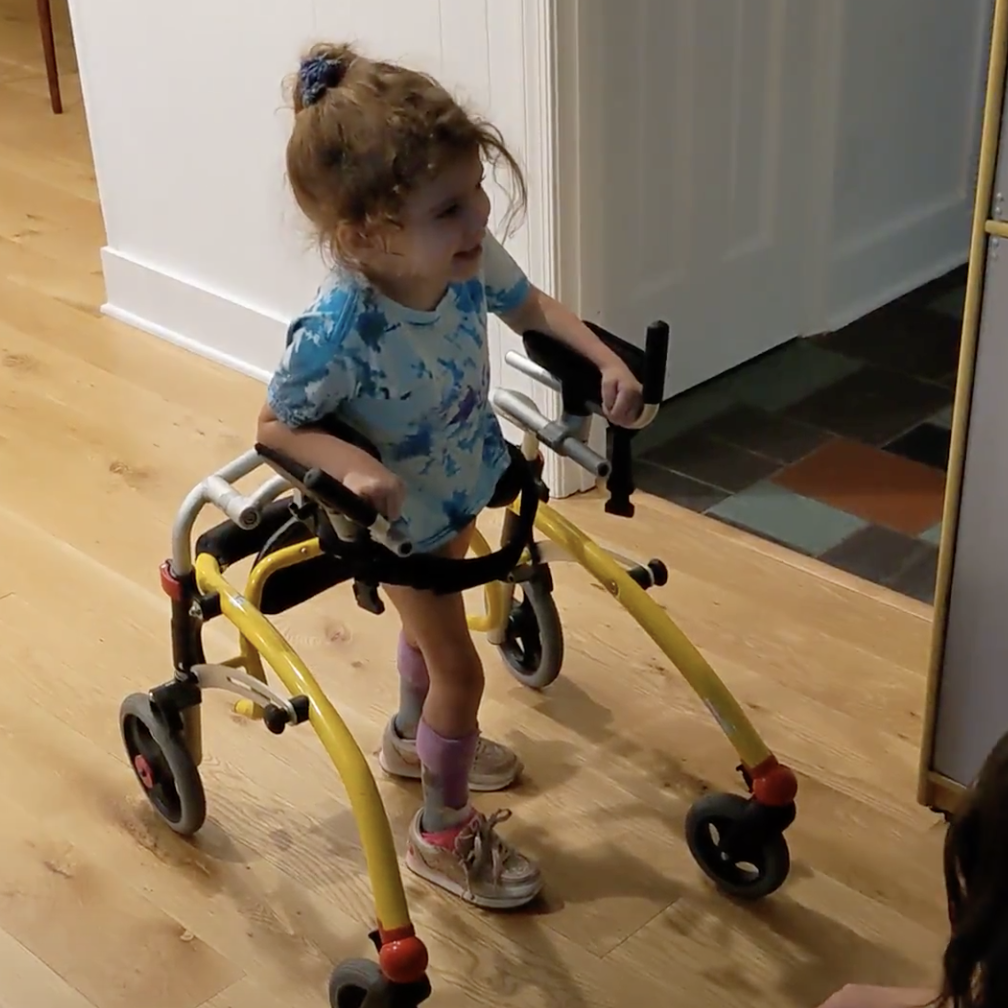Janus Kinase (JAK) Inhibition in Aicardi–Goutières Syndrome (AGS)
Overview
The Aicardi-Goutieres Syndrome Advocacy Association (AGSAA), AGS experts, and AGS families overwhelmingly recommend the use of a class of drugs called “JAK inhibitors” to ameliorate the consequences of AGS disease activity. The mostly widely used and studied JAK inhibitor, baricitinib (brand name Olumiant), was originally developed for the treatment of rheumatoid arthritis and repurposed to treat AGS and other related conditions. This is called “off-label” use, a common practice in rare conditions. Depending on your location and the availability of these medicines, you might use ruxolitinib (brand name Jakafi), tofacitinib (brand name Xeljanz), or other “jakinibs” to the same effect; although we still recommend baricitinib for the safety, dosing, and efficacy information available to our disorder. AGS children and adults take this small, easily dissolvable pill multiple times a day at much higher doses than adults with rheumatoid arthritis to relieve inflammation caused by AGS. Studies have shown that AGS children of all ages and degrees of neurologic severity have the potential to benefit from baricitinib, including both improvements in their quality of life as well as the acquisition of developmental skills/milestones. Treatment with baricitinib requires a long term commitment, and its benefits may not be readily apparent. The primary goal of treatment is to offer protection against brain damage; no change is a good thing. However, many parents report an immediate improvement in irritability, sleep, and secondary symptoms (e.g. skin issues). JAK inhibition remains complex, requires careful monitoring for changes and events related to significant immunosuppression, and typically involves a multi-disciplinary approach. Nevertheless, AGS is a complex and serious disease that requires aggressive approaches.
Rationale
The Leukodystrophy Center of Excellence at the Children’s Hospital of Philadelphia (CHOP) has performed the most extensive research available with the Janus kinase inhibitor baricitinib. In an open label study that included 35 children on study for at least 12 months, the authors concluded that barcitinib can be of benefit to those living with AGS, regardless of their current condition.
The measurement of neurologic improvement is complex, but our data suggest improvement in neurologic function, even in patients with severe and long-standing disease.
Acquisition of Developmental Skills With JAK Inhibition
Figure represents acquisition or loss of developmental milestones in the individual patients during study treatment. Each bar represents an individual patient. During the study (while treated with baricitinib) children with AGS were significantly more likely to achieve new developmental skills and significantly less likely to lose them.
Consequently, the American College of Rheumatology (ACR) and European Alliance of Associations for Rheumatology (EULAR) convened a task force a consisting of rheumatologists, neurologists, an immunologist, geneticists, patient advocates, and an allied health care professional formulated research questions for a systematic literature review. Then, based on literature, Delphi questionnaires, and consensus methodology, the ACR and EULAR developed “points to consider” to guide patient management. Collectively, the authority on AGS and other interferonopathies concluded the following points and recommend the use of JAK inhibitors.
Chronic systemic and organ-specific inflammation is present in patients with CANDLE/PRAAS, SAVI, and AGS. When untreated, chronic inflammation results in progressive organ damage, early morbidity, and increased mortality.
[…] The goal of treatment of autoinflammatory type I interferonopathies is to prevent and/or decrease systemic and organ inflammation, thereby improving the quality of life.
[…] For improving CANDLE/PRAAS, SAVI, and AGS symptoms, Janus kinase (JAK) inhibitors are beneficial.
At our 2022 AGS Family Symposium, Dr. Laura Adang discussed the benefits of barcitinib that were observed during their trial. Neurological benefits of baricitinib were demonstrated through a retrospective natural history study and the development of the AGS Scale.
References
Children’s Hospital of Philadelphia. Online Pediatric Education Network. Aicardi Goutieres Syndrome: Diagnosis and Management. https://open.chop.edu/courses/aicardi-goutieres-syndrome-diagnosis-and-management/
Baricitinib for use in monogenic interferonopathies (adults and children 2 years and over). The National Health Service (NHS). https://www.england.nhs.uk/publication/baricitinib-for-use-in-monogenic-interferonopathies-adults-and-children-2-years-and-over/
Children’s Hospital of Philadelphia.. Aicardi Goutières Syndrome (AGS) Diagnosis and Management Webinar. Jun 4, 2021. https://www.youtube.com/watch?v=iSDWelTzy_o
Clinical Trials
Baricitinib
Phase 1 - A phase of research to describe clinical trials that focus on the safety of a drug. They are usually conducted with healthy volunteers, and the goal is to determine the drug's most frequent and serious adverse events and, often, how the drug is broken down and excreted by the body. These trials usually involve a small number of participants.
Phase 2 - A phase of research to describe clinical trials that gather preliminary data on whether a drug works in people who have a certain condition/disease (that is, the drug's effectiveness).
It's important to note that researchers at CHOP decided that giving placebo to participants of the second phase trial would be inhumane because of the benefits that they observed in patients during the first phase. Still, they emphasized in PR materials that their phase 1 trial would not focus on assessing efficacy.
Dr. Vanderver emphasizes that the current project is not about testing whether or not baricitinib works. Instead, it focuses on the creation of appropriate assessments and biomarkers for testing the effectiveness of all proposed treatments for AGS.
Use of baricitinib in AGS spawned out of work by Dr. Goldbach-Mansky at the National Institute of Health (NIH). It was, in fact, the same phase 1 clinical trial. They transferred the study from the NIH to CHOP and began enrolling more children with AGS. The NIH did the original ground work of figuring out how to dose the drug and measure its effect on disease biomarkers. Unfortunately, we lost one child with AGS during the clinical trial; but the teams decided that it wasn't directly the cause of the drug and could be explained by complications from their disease.
Testimonials
Four weeks of active regression from disease onset stopped immediately with baricitinib. We thought she was dying. After starting treatment she started lifting her head up, sleeping through the night, and got happy again. No neuro issues since and now walking and talking with assistance at 4.5 y/o.
- Patrick Winters, Research Director
Oh my goodness, Hudson has eaten 5 full meals completely by mouth!!! This is absolutely amazing and 100% a benefit from the medication. He’s chewing, able to manipulate the food around his mouth suddenly and even taking his bottle which he loves but hasn't been able to do in a month or more. He is also sleeping without being on top of me for the first time in 8 months and he is smiling again.
- Jamie Bennett, Parent Caregiver
Wyatt is doing better every day. He is back to eating pretty much anything we give him. Arm movement is better each day and is now opening right hand and just held his fork. His mood has done a complete 180 from pretty much birth. I've not really ever seen him so content and chill. Day 7 of [baricitinib].
- Kyle Port, Parent Caregiver
[Before baricitinib], he basically showed no emotion. Within a short period of time, Gabe's body began to wake up from head to toe. It was the most wonderful feeling in the world to get my son back... This medication has changed his life and he is thriving.
- Jenni Cicerone, Parent Caregiver
Resources
The AGSAA provides the following resources to aid you when working with your doctors and insurances. Please email support@agsaa.org and we will provide you with all references and assist you.
JAK Inhibition, Insurance Appeal Letter Template
Most health insurances, whether national or private, will most likely summarily deny your initial request for coverage of JAK inhibitors. Your doctor may not involve you in this process, but we highly recommend advocating for yourself and submitting your own letter of appeal. We provide the following template which includes the appropriate references and rationale.






